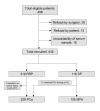Serum antibodies against genitourinary infectious agents in prostate cancer and benign prostate hyperplasia patients: a case-control study
- PMID: 21291519
- PMCID: PMC3039631
- DOI: 10.1186/1471-2407-11-53
Serum antibodies against genitourinary infectious agents in prostate cancer and benign prostate hyperplasia patients: a case-control study
Abstract
Background: Infection plays a role in the pathogenesis of many human malignancies. Whether prostate cancer (PCa) - an important health issue in the aging male population in the Western world - belongs to these conditions has been a matter of research since the 1970 s. Persistent serum antibodies are a proof of present or past infection. The aim of this study was to compare serum antibodies against genitourinary infectious agents between PCa patients and controls with benign prostate hyperplasia (BPH). We hypothesized that elevated serum antibody levels or higher seroprevalence in PCa patients would suggest an association of genitourinary infection in patient history and elevated PCa risk.
Methods: A total of 434 males who had undergone open prostate surgery in a single institution were included in the study: 329 PCa patients and 105 controls with BPH. The subjects' serum samples were analysed by means of enzyme-linked immunosorbent assay, complement fixation test and indirect immunofluorescence for the presence of antibodies against common genitourinary infectious agents: human papillomavirus (HPV) 6, 11, 16, 18, 31 and 33, herpes simplex virus (HSV) 1 and 2, human cytomegalovirus (CMV), Chlamydia trachomatis, Mycoplasma hominis, Ureaplasma urealyticum, Neisseria gonorrhoeae and Treponema pallidum. Antibody seroprevalence and mean serum antibody levels were compared between cases and controls. Tumour grade and stage were correlated with serological findings.
Results: PCa patients were more likely to harbour antibodies against Ureaplasma urealyticum (odds ratio (OR) 2.06; 95% confidence interval (CI) 1.08-4.28). Men with BPH were more often seropositive for HPV 18 and Chlamydia trachomatis (OR 0.23; 95% CI 0.09-0.61 and OR 0.45; 95% CI 0.21-0.99, respectively) and had higher mean serum CMV antibody levels than PCa patients (p = 0.0004). Among PCa patients, antibodies against HPV 6 were associated with a higher Gleason score (p = 0.0305).
Conclusions: Antibody seropositivity against the analyzed pathogens with the exception of Ureaplasma does not seem to be a risk factor for PCa pathogenesis. The presence or higher levels of serum antibodies against the genitourinary pathogens studied were not consistently associated with PCa. Serostatus was not a predictor of disease stage in the studied population.
Figures


Similar articles
-
[Serum antibody levels of cytomegalovirus, herpes simplex type I and adenovirus in patients with benign or malignant prostatic neoplasms].Mikrobiyol Bul. 1986 Jul;20(3):165-75. Mikrobiyol Bul. 1986. PMID: 2436029 Turkish.
-
Plasma antibodies against Chlamydia trachomatis, human papillomavirus, and human herpesvirus type 8 in relation to prostate cancer: a prospective study.Cancer Epidemiol Biomarkers Prev. 2007 Aug;16(8):1573-80. doi: 10.1158/1055-9965.EPI-07-0134. Cancer Epidemiol Biomarkers Prev. 2007. PMID: 17684131 Free PMC article.
-
Molecular Detection of Pathogens Causing Sexually Transmissible Infections in Patients with Prostate Cancer and Hyperplasia by Quantitative TaqMan Real-Time PCR Assay.Clin Lab. 2019 Jul 1;65(7). doi: 10.7754/Clin.Lab.2019.181243. Clin Lab. 2019. PMID: 31307183
-
Should we be testing for urogenital Mycoplasma hominis, Ureaplasma parvum and Ureaplasma urealyticum in men and women? - a position statement from the European STI Guidelines Editorial Board.J Eur Acad Dermatol Venereol. 2018 Nov;32(11):1845-1851. doi: 10.1111/jdv.15146. Epub 2018 Jul 6. J Eur Acad Dermatol Venereol. 2018. PMID: 29924422 Review.
-
Human papillomavirus and prostate cancer: systematic review and meta-analysis.Sci Rep. 2023 Oct 3;13(1):16597. doi: 10.1038/s41598-023-43767-7. Sci Rep. 2023. PMID: 37789036 Free PMC article.
Cited by
-
Pretransplantation seroreactivity in kidney donors and recipients as a predictive factor for posttransplant BKPyV-DNAemia.Front Immunol. 2022 Jul 25;13:929946. doi: 10.3389/fimmu.2022.929946. eCollection 2022. Front Immunol. 2022. PMID: 35967393 Free PMC article.
-
Pretransplant BK Virus-Specific T-Cell-Mediated Immunity and Serotype Specific Antibodies May Have Utility in Identifying Patients at Risk of BK Virus-Associated Haemorrhagic Cystitis after Allogeneic HSCT.Vaccines (Basel). 2021 Oct 22;9(11):1226. doi: 10.3390/vaccines9111226. Vaccines (Basel). 2021. PMID: 34835157 Free PMC article.
-
Activation of EGFR-PI3K-AKT signaling is required for Mycoplasma hyorhinis-promoted gastric cancer cell migration.Cancer Cell Int. 2014 Dec 5;14(1):135. doi: 10.1186/s12935-014-0135-3. eCollection 2014. Cancer Cell Int. 2014. PMID: 25505372 Free PMC article.
-
Multiple pathogens and prostate cancer.Infect Agent Cancer. 2022 May 30;17(1):23. doi: 10.1186/s13027-022-00427-1. Infect Agent Cancer. 2022. PMID: 35637508 Free PMC article. Review.
-
Gonorrhea infection increases the risk of prostate cancer in Asian population: a nationwide population-based cohort study.Eur J Clin Microbiol Infect Dis. 2017 May;36(5):813-821. doi: 10.1007/s10096-016-2866-7. Epub 2016 Dec 24. Eur J Clin Microbiol Infect Dis. 2017. PMID: 28013414
References
-
- Marberger M. Prostate cancer 2008: Challenges in diagnosis and management. Eur Urol Suppl. 2009;3:89–96. doi: 10.1016/j.eursup.2008.10.003. - DOI
-
- Herbert JT, Birkhoff JD, Feorino PM, Caldwell GG. Herpes simplex virus type 2 and cancer of the prostate. J Urol. 1976;116:611–612. - PubMed
-
- Baker LH, Mebust WK, Chin TDY, Chapman AL, Hinthorn D, Towle D. The relationship of herpesvirus to carcinoma of the prostate. J Urol. 1981;125:370–374. - PubMed
-
- Strickler HD, Burk R, Shah K, Viscidi R, Jackson A, Pizza G, Bertoni F, Schiller JT, Manns A, Metcalf R, Qu W, Goedert JJ. A multifaceted study of human papillomavirus and prostate carcinoma. Cancer. 1998;82(6):1118–1125. doi: 10.1002/(SICI)1097-0142(19980315)82:6<1118::AID-CNCR16>3.0.CO;2-9. - DOI - PubMed
Publication types
MeSH terms
Substances
LinkOut - more resources
Full Text Sources
Medical
Miscellaneous

